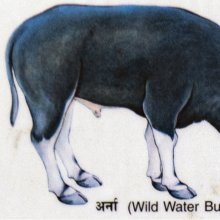Arna, Aṛṇa, Arina, Arṇa, Ārīṇa, Arnā: 12 definitions
Introduction:
Arna means something in Hinduism, Sanskrit, Marathi, Hindi. If you want to know the exact meaning, history, etymology or English translation of this term then check out the descriptions on this page. Add your comment or reference to a book if you want to contribute to this summary article.
Arna has 11 English definitions available.
The Sanskrit term Aṛṇa can be transliterated into English as Arna or Arina, using the IAST transliteration scheme (?).
Images (photo gallery)
Languages of India and abroad
Sanskrit dictionary
[Deutsch Wörterbuch]
Source: Cologne Digital Sanskrit Dictionaries: Böhtlingk and Roth Grosses Petersburger WörterbuchArṇa (अर्ण):—
--- OR ---
Arṇa (अर्ण):—
2) a) Meer: vyasanamuttara dustarārṇam [Bhāgavatapurāṇa 4, 22, 40.] guṇagaṇārṇa [10, 35, 19.] — c) Buchstab, Silbe [WEBER, Rāmatāpanīya Upaniṣad 309. 311. fg.] [PAÑCAR.3,15,57.] [Oxforder Handschriften 149,b,30. 39. 42.] — d) [Weber’s Indische Studien 8, 408. fgg.] — e) pl. Nomen proprium eines Volkes [Bhāgavatapurāṇa 10, 86, 20.]
--- OR ---
Arṇa (अर्ण):—
Source: Cologne Digital Sanskrit Dictionaries: Sanskrit-Wörterbuch in kürzerer FassungArṇa (अर्ण):——
1) m. n. Rinnsal , Strom. [Ṛgveda (roth). 1,174,2] arṇā nicht mit Padap. arṇāḥ. —
2) m. — a) Buchstab , Silbe. — b) ein best. Metrum. — c) *Teakbaum. — d) Nomen proprium eines Mannes. —
3) *f. ā Fluss [Galano's Wörterbuch]
Sanskrit, also spelled संस्कृतम् (saṃskṛtam), is an ancient language of India commonly seen as the grandmother of the Indo-European language family (even English!). Closely allied with Prakrit and Pali, Sanskrit is more exhaustive in both grammar and terms and has the most extensive collection of literature in the world, greatly surpassing its sister-languages Greek and Latin.
See also (Relevant definitions)
Starts with (+23): Arnacitraratha, Arnag, Arnal, Arnam-amir, Arnas, Arnasa, Arnasati, Arnashala, Arnasimha, Arnasvant, Arnasvat, Arnatto, Arnattu, Arnav, Arnava, Arnavabhava, Arnavadvipa, Arnavaja, Arnavajata, Arnavamadhya.
Ends with (+809): Abhimlatavarna, Abhyarna, Acchinnaparna, Achchhinnaparna, Addhalohakarna, Addhyalohakarna, Adhamarna, Adhikarna, Adhilohakarna, Adhiparna, Adhirudhakarna, Adhyardhasuvarna, Adityavarna, Agnicarna, Agnicharna, Agnivarna, Aidasauparna, Aikyavarna, Ajakarna, Ajaparna.
Full-text (+34): Arnas, Arnobhava, Arnasa, Arnava, Arnovrit, Arnacitraratha, Arnasvat, Arno, Vyarna, Anna, Abhyarna, Arnoda, Arana, Citradrishika, Abhyarnata, Pratyarnam, Arnasati, Arnasvant, Nyarna, Arnavodbhava.
Relevant text
Search found 7 books and stories containing Arna, Aṛṇa, Arina, Arṇa, Ārīṇa, Arīṇa, Arṇā, Arnā; (plurals include: Arnas, Aṛṇas, Arinas, Arṇas, Ārīṇas, Arīṇas, Arṇās, Arnās). You can also click to the full overview containing English textual excerpts. Below are direct links for the most relevant articles:
Rivers in Ancient India (study) (by Archana Sarma)
6. Derivation of the term Nadī < [Chapter 1 - Introduction]
2(a). The river Sarasvatī in the Vājasaneyī-saṃhitā (Introduction) < [Chapter 2 - The Rivers in the Saṃhitā Literature]
4. The rivers in the minor Upaniṣads < [Chapter 4 - The Rivers in the Āraṇyaka and Upaniṣadic Literature]
Rig Veda (translation and commentary) (by H. H. Wilson)
Maha Prajnaparamita Sastra (by Gelongma Karma Migme Chödrön)
Part 3 - Why is the Buddha called Arhat < [Chapter IV - Explanation of the Word Bhagavat]
Paduka-panchaka (the five-fold footstool) (by Arthur Avalon)
Mareecha in Valmiki and Adhyatma Ramayana < [October – December, 2003]
Satapatha-brahmana (by Julius Eggeling)
Kāṇḍa I, adhyāya 5, brāhmaṇa 1 < [First Kāṇḍa]


